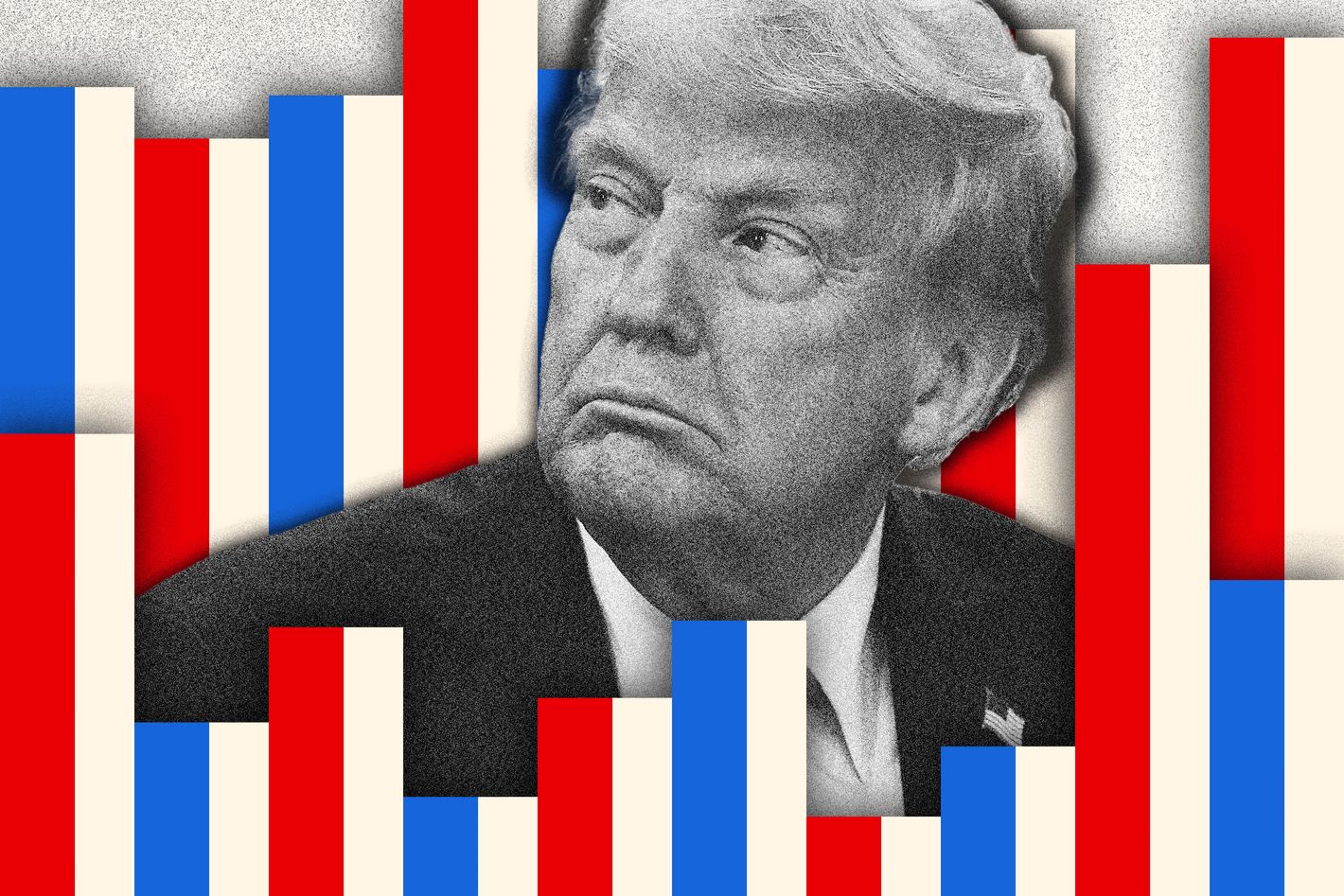Photo-Illustration: Intelligencer; Photo: Getty Images
For a while there, it looked like Donald Trump’s job-approval ratings were stabilizing after a gradual slide beginning with his inauguration followed by a distinct slip after “Liberation Day,” with its bonkers tariff program. But the most recent polls showed another downward lurch, as Nate Silver observed on April 24:
Donald Trump hit a new low in our presidential approval average today after we added new polls from YouGov, Pew, and Fox News. He’s at 44.8 percent approval and 51.8 percent disapproval, which works out to a net approval rating of -7.0. Now he’s still doing better than the first time around (94 days into his first term, Trump’s net approval rating was -9.1) but the gap between term one and term two is closing fast.
Trump’s net approval rating at RealClearPolitics, which doesn’t weight specific polls and thus probably gives certain frequent pro-Trump outlier pollsters a thumb on the scales, is now minus-5.5 percent (46.1 percent approval, 51.6 percent disapproval). It was minus-0.3 percent on April 2. Of particular concern to Republicans might be a deterioration in his Fox News averages from a net minus-2 percent in March to minus-11 percent in April. Regular poll watchers also probably raised eyebrows when the most recent large-sample Pew Research Center survey landed this week, showing Trump’s net approval plunging from minus-4 percent in late January to minus-19 percent now (with 48 percent disapproving very strongly).
The cumulative drop in Trump’s popularity since he returned to the White House is now pretty stark. Looking at the Silver Bulletin polling averages (the most reliable available after ABC shut down FiveThirtyEight), which use a very inclusive survey database with results weighted for recency and demonstrated quality, the president’s job-approval ratio was at 51.6 percent positive and 40 percent negative on January 20, producing a net positive rating of 11.6 percent. Today’s minus-7 percent net approval rating means Trump has slipped a net 18.6 percent since he took his second oath of office.
Looking behind the top-line numbers, Trump’s job approval with respect to his handling of particular issues or challenges appears to be going underwater across the board, with the exception of pollsters narrowly asking about “border security” rather than “immigration.” On this latter issue, one of Trump’s strongest in 2024, his standing is eroding almost everywhere you look. He was underwater in approval on immigration in recent polls from Fox News, Pew Research, Reuters-Ipsos, Quinnipiac, and Economist-YouGov. As recently as last month, Economist-YouGov gave him a plus-13 percent net approval rating on immigration. And limited polling on Trump’s handling of the Kilmar Abrego Garcia dispute shows very little if any public opinion runway for further defiance of federal court orders.
What makes this trend especially significant is that there’s not some other issue on which Trump is very popular at present. In the most recent Economist-YouGov survey, eight different issue areas were tested for Trump job approval (jobs and the economy, immigration, foreign policy, national security, education, crime, criminal justice reform, and inflation/prices). The president had net negative approval on all eight. Considering the crucial importance of economic issues to swing voters, it’s notable that in the same poll, Trump’s approval ratio on jobs and the economy was 41 percent positive and 53 percent negative, and on inflation/prices, it was 37 percent positive and 57 percent negative.
That’s hardly atypical. The latest (April 18–21) Fox News poll placed Trump’s approval ratings at 38 percent positive and 56 percent negative on the economy, and 33 percent positive and 59 percent negative on inflation. The April 21 Reuters-Ipsos poll showed very similar numbers: 37 percent positive and 51 percent negative on the economy and 31 percent positive and 57 percent negative on “cost of living.” And to be clear, this is before we’ve seen much tangible impact from Trump’s unpopular tariffs, which big majorities of Americans (77 percent of them in an AP-NORC poll released just today) fear will boost consumer prices.
If prices do spike, there aren’t really any issues on which unhappy voters can rely to adjudge Trump as better than possible alternatives.

